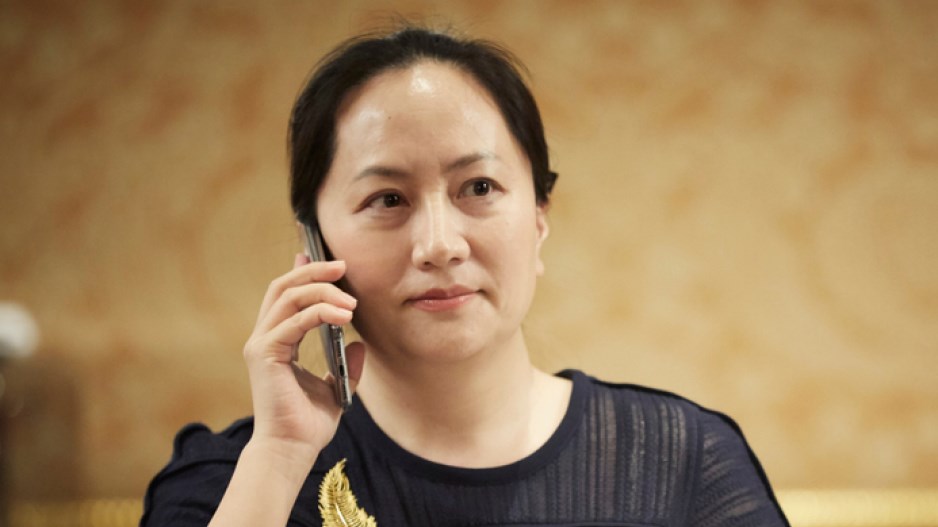Huawei Technologies Co. Ltd. CFO Meng Wanzhou, who faces the start of her extradition hearing to the United States on Wednesday, is filing a civil suit against the Canadian government and several other agencies for breaching her "constitutional rights."
Meanwhile, Beijing is seen stepping up pressure in the case, officially accusing the two Canadians detained in China since Meng's arrest - Michael Kovrig and Michael Spavor - of "stealing sensitive information and intelligence," according to a statement by the Chinese Communist Party's Central Political and Legal Affairs Commission.
According to the statement issued Monday, Chinese officials say Kovrig has been acquiring intelligence since entering China in 2017 on business visas. The statement said Spavor is one of Kovrig's main contacts. Both men were arrested on Dec. 10, just days after Meng was arrested at Vancouver International Airport on Dec. 1.
In a response to media questions Monday about Kovrig and Spavor not having access to lawyers while being detained, Chinese Ministry of Foreign Affairs spokesman Lu Kang denied that there's a double-standard in Beijing's treatment of the Canadians versus Canada's processing of Meng, noting that Chinese authorities have maintained contact with Canadian diplomatic officials on Kovrig and Spavor's cases in accordance to the diplomatic agreement between the two countries.
"At the same time, I think you already know that Chinese authorities took forceful actions - in accordance with the law - against Canadian citizens Kovrig and Spavor because they were involved in activities that threatened China's national security," Lu said in a transcript in response to media questions on the alleged double-standard. "I think you understand very clearly that, when compared to how other countries handle this kind of cases involving national security, the way Chinese authorities have handled this in a very similar way."
Lu added - in response to questions about Meng's civil suit - that questions should be directed to Huawei. But he also noted that China's position remains clear that Meng's arrest is a "misuse" of the U.S.-Canada extradition treaty and "seriously violated the legal rights" of a Chinese citizen, and again called for Washington to cancel the extradition request and for Ottawa release the Huawei executive.
Men's civil suit was filed Friday in B.C. Supreme Court against the federal government, the RCMP and the Canadian Border Services Agency (CBSA). In the lawsuit, Meng is claiming damages for mental distress and a loss of liberty as a result of the RCMP holding her for three hours without access to lawyers after she was arrested at Vancouver International Airport on Dec. 1.
The lawsuit alleged that, after Meng was identified after getting off her plane from Hong Kong, the police took her to inspection without immediately identifying the nature of the detention (including the lack of a presentation of the arrest warrant until three hours later). Meng also said she was separated from her travel companion and other passengers, not being allowed to speak with anyone while she was detained at the airport.
Meng further alleges that officers requested Meng turn over all computers and electronic devices to the authorities, and Meng - thinking she did not have a choice without the guidance of legal counsel - complied. The lawsuit then alleged that border officers "unlawfully opened and viewed the contents" of the seized devices, violating Meng's right to privacy.
"This case concerns a deliberate and pre-meditated effort on the part of the Defendant officers to obtain evidence and information from the Plaintiff in a manner which they knew constituted serious violations of the Plaintiff's rights under the Canadian Charter of Rights and Freedoms," the lawsuit said.
Huawei and Meng are facing allegations of money laundering, bank fraud, wire fraud, violating U.S. sanctions against business operations in Iran, and stealing trade secrets from U.S.-based companies. The charges from the U.S. Department of Justice alleges that Meng and Huawei operated Skycom Tech Co. Ltd. as a subsidiary that did business in Iran. Also, U.S. authorities say other Huawei subsidiaries allegedly tried to steal trade secrets from companies like T-Mobile USA, and noted in its charges that the FBI has obtained e-mails that showed "Huawei offered bonuses to employees based on the value of information" obtained by employees.
Huawei has denied those allegations.
The extradition hearing is scheduled to begin on Wednesday in Vancouver after the Canadian Department of Justice said last Friday it is allowing the extradition process to proceed because there is sufficient evidence for the case to be put before an extradition judge.
The case has caused a major rift in Canada-China relations; in addition to Korvig and Spavor's arrests, there was also the issuing of travel advisories by both Beijing and Ottawa to citizens for traveling to each other's countries. Plus, several Canadian businesses - including those here in B.C. - have expressed concern that China may choose to retaliate via trade barriers or other non-tariff regulatons targetting trade, which would disproportionately effect B.C. given the province's higher exposure to the Chinese market.
Huawei has been in the Canadian market investing in research and related businesses for a decade. It is most notable for being a sponsor to Hockey Night in Canada, but its devices are currently banned from the government network in the United States. Several countries have prohibited the company - one of the only developers of incoming 5G mobile wireless network technology in the world - from handling any part of 5G development in those nations.
Meng is the daughter of Huawei founder Ren Zhengfei.




